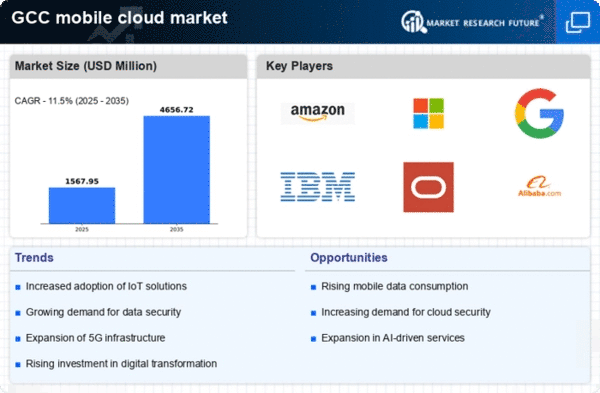Expansion of 5G Infrastructure
The rollout of 5G infrastructure in the GCC is poised to significantly impact the mobile cloud market. With enhanced data speeds and reduced latency, 5G technology facilitates seamless connectivity for mobile devices, enabling more efficient cloud services. This advancement is expected to drive the adoption of mobile cloud solutions, as businesses leverage the capabilities of 5G to enhance their operations. The mobile cloud market stands to gain from this technological evolution, as it allows for real-time data processing and improved user experiences. As of November 2025, several GCC countries have made substantial investments in 5G networks, with projections indicating that 5G subscriptions could reach 50 million by 2027. This expansion is likely to create new opportunities for mobile cloud service providers, fostering innovation and growth within the industry.
Growing Emphasis on Data Analytics
The mobile cloud market is benefiting from a growing emphasis on data analytics within the GCC region. As organizations collect vast amounts of data, the need for advanced analytics tools that can be accessed via mobile devices becomes increasingly critical. This trend is driving the demand for mobile cloud solutions that offer robust data processing and analytical capabilities. According to industry reports, the data analytics market in the GCC is expected to reach $1 billion by 2026, indicating a strong potential for growth in the mobile cloud market. The mobile cloud market is likely to capitalize on this trend, as businesses seek to harness data insights to inform decision-making and enhance operational performance.
Rising Demand for Mobile Applications
The mobile cloud market is experiencing a surge in demand for mobile applications across various sectors in the GCC. This trend is driven by the increasing reliance on smartphones and tablets for business operations and personal use. As organizations seek to enhance customer engagement and streamline operations, the need for mobile applications that leverage cloud capabilities becomes paramount. According to recent data, the mobile application market in the GCC is projected to grow at a CAGR of 15% from 2025 to 2030. This growth is likely to propel the mobile cloud market, as businesses integrate cloud services to support mobile app development and deployment. Consequently, the mobile cloud market is positioned to benefit from this rising demand, as it enables developers to create scalable and efficient applications that meet the evolving needs of users.
Emergence of Innovative Business Models
The mobile cloud market is witnessing the emergence of innovative business models that leverage cloud technologies to create new revenue streams. Companies in the GCC are increasingly adopting subscription-based services, pay-as-you-go models, and platform-as-a-service offerings to enhance their market reach. This shift is indicative of a broader trend towards flexibility and scalability in service delivery, which aligns with the needs of modern consumers. As businesses explore these innovative models, the mobile cloud market is expected to experience growth, driven by the demand for solutions that can adapt to changing market dynamics. The potential for increased profitability through these models may encourage further investment in mobile cloud technologies, fostering a competitive landscape.
Increased Focus on Digital Transformation
The mobile cloud market is witnessing a heightened focus on digital transformation initiatives among businesses in the GCC. Organizations are increasingly adopting cloud-based solutions to enhance operational efficiency, improve customer experiences, and drive innovation. This shift is indicative of a broader trend towards modernization, where companies are leveraging mobile cloud technologies to streamline processes and reduce costs. Recent statistics suggest that over 70% of enterprises in the GCC are prioritizing digital transformation strategies, which in turn fuels the demand for mobile cloud services. The mobile cloud market is likely to thrive as businesses seek to integrate cloud capabilities into their mobile strategies, enabling them to remain competitive in an evolving digital landscape.
















